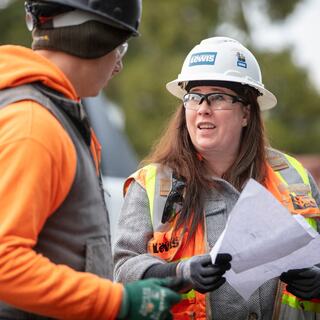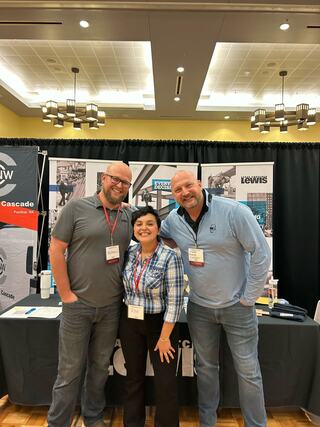About Us
Since the company's founding in 1886, we've been committed to creating lasting value for our clients and communities.
We take pride in tackling challenges and exceeding expectations, because fulfillment is found in a job well done. Every detail impacts the integrity of our work and the safety of our people. As employee-owners, we’re passionate about getting it done right every time, from precise estimates to quality workmanship and on-time completion.

At Lewis, our employee-owners are personally invested in the success of our clients and empowered to meet their goals.
Our Culture
Markets
Explore our projects.
Project Spotlights
222 Fifth
Seattle, Washington
Located steps from Seattle Center and MoPOP, 222 Fifth is a cutting-edge research and development building. The offset massing acknowledges the sculptural forms of its landmark neighbors.
View ProjectProvidence St. Vincent Emergency Department
Portland, Oregon
The Portland metro area's busiest ED now has increased capacity, enhanced operational efficiency, and vital infrastructure upgrades.
View ProjectHI2 Data Center
Hillsboro, Oregon
This 420,000-square-foot, 66-megawatt data center is part of 138-megawatt campus expansion in Hillsboro, Oregon.
View Project
From labs to learning spaces, office towers to hospitals, there’s a good chance we’ve built it.
View All Projects
How We Build
As problem-solvers at our core, we bring together the right people, the best tools and proven approaches to deliver lasting value.
Learn More
Community
We focus our efforts where we can make the most impact: supporting education, creating career pathways and driving equity in construction.
How We Invest
Careers
Our employee-owners have a stake in the company’s success and a voice in shaping its future.
Join UsNews
The Latest from Lewis
View All
Expanding Career and Technical Education on the Oregon Coast
With interest in career and technical education (CTE) programs surging, Oregon Coast Community College is building on its longstanding role in local workforce development to meet the moment.
In early 2026, construction will be ramping up on the college’s Oregon Coast Advanced Technology & Trades (OCATT) Center in Newport.
Envisioned as a hub for hands-on learning and workforce development, OCATT will open new pathways for Lincoln County residents to train, work, and build lasting careers close to home.
When complete in 2027, the 22,000-square-foot facility will provide hands-on training in construction and carpentry, industrial facilities maintenance, maritime technology, HVAC systems, and welding, as well as pre-apprenticeship offerings.
A learning environment without silos
The Center has been designed to reflect the cross-disciplinary nature of today’s industries and trades. Rather than assigning spaces to fixed programs, the building is organized around skill sets.
“From the beginning, the college wanted a space that was incredibly flexible,” said Tyler Whitehead, partner at BNDRY Studio and the project’s CTE consultant.
The architect of record, GLAS Architects, along with design architect Hacker Architects and BNDRY, developed a concept focused on four primary labs: building systems, mechanical systems, electronic systems, and a “dirty build” lab for metalwork, welding, and diesel engines. Complementing them is a flexible learning wing.
“Nothing in the real world happens in silos,” says Christopher Walkup, a principal at GLAS. “We wanted to replicate that sense of collaboration and crossover. You might learn how to use a skill saw in one space, then apply those same safety and problem-solving skills in another.”
That flexibility extends far beyond layout. The building is being designed to evolve as industries and community needs change. That might mean reconfiguring them to host new equipment, supporting new certifications, or aligning with emerging technologies like automation.
“It’s about teaching students how to learn,” Whitehead said. “The programs can shift quickly based on what the community needs, because the building itself is built to respond.”

Foreman Feature: Lorie Tibbetts
If you’ve ever admired a large-scale Lewis commercial project in Seattle, there’s a good chance general foreman Lorie Tibbetts helped build it.
Over her career, Lorie and her crews have placed more than 560,000 cubic yards of concrete. That’s 2.2 billion pounds of material.
Her journey with Lewis began back in 1990. She was 22 when a friend suggested she ask a superintendent for a spot on the Second & Seneca tower project. Before long, she found herself helping with a concrete pour, rake in hand.
That opportunity launched a career defined by both technical expertise and the ability to build strong, close-knit crews. Ranging from six to eight people, Lorie’s teams move together from job to job and handle everything from building structures, to flagging, to final cleaning.

New ORs and Upgrades Coming to Legacy Emanuel West Tower
Our healthcare team is gearing up for a transformative four-year project at Legacy Health Emanuel Medical Center’s West Tower in Portland. Kicking off this fall, phase one includes adding 14 new operating rooms within an existing shell space.
Working alongside ZGF Architects and Pacific Ironclad, other critical upgrades involve building out new pre- and post-surgery recovery areas, a state-of-the-art Sterile Processing Department (SPD), dedicated Adult and Pediatric PACUs (Post-Anesthesia Care Units), and more.
Through early planning and advanced virtual design technology, we’re coordinating with patient care teams to minimize disruptions and navigate existing conditions.
It’s an honor to support Legacy’s commitment to delivering exceptional patient care for the community.














